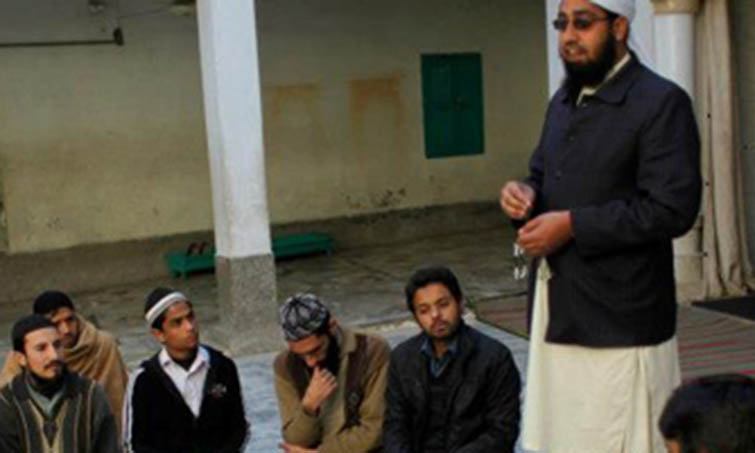In many areas of Pakistan, religious beliefs and political affiliations influence public opinion. Imams are joining the fight against polio by reassuring everyone that no harm – medical, social or religious – comes from the life-saving vaccine.
A sermon by an imam is all it takes to change misconceptions about the polio vaccines in some communities in Khyber Pakhtunkhwa Province, in northwest Pakistan A brief talk by the religious leader reassures everyone that no harm – medical, social or religious – comes from the life-saving vaccine. “For some, a visit by the imam is good enough,” said Imam Maulana Mohammad Asim, who heads the Idara-e-Taleem-ul-Quran school and mosque in PakhaGhulam, a Union Council in the suburbs of Peshawar.

“If the nation can benefit from our services, and the huge amount of funds that the government and its partners are spending on polio eradication can control the spread of the disease, polio could be eliminated and children could be saved from being physically handicapped. Why should we not play our role in this campaign?” he added. Polio cases on the risePakistan is one of the three countries where polio remains endemic, accounting for about 30 per cent of the world’s the polio cases. During 2011, the total number of cases was 198, up from 144 cases in 2010. There have already been 15 cases since the start of 2012.
However, this is a sharp decline from the early 1990s, when an estimated 20,000 cases a year were recorded in Pakistan. Due to the combined efforts of the government and Polio Eradication Initiative partners, the figure decreased to 27 cases in 2005. Still, over the last few years, the number of polio cases has begun to rise alarmingly. In response, the National Emergency Action Plan (NEAP) for eradication of polio was launched by the Government of Pakistan in 2011. UNICEF, the World Health Organization (WHO) and other partners, including various governments and donors, are adopting new approaches to eliminating polio. These include the involvement of religious leaders in the process of educating communities about the importance and efficacy of polio vaccination. In many areas of Khyber Pakhtunkhwa, religious beliefs and political affiliations influence public opinion. The imam of the local mosque is considered a central source of religious and cultural knowledge, and is referred to for guidance on controversial matters. Imam Asim is well aware of the misconceptions about polio vaccines that prevail among certain groups and individuals in his area. In order to dispel these misconceptions and to support the National Immunisation Days (NIDs) campaign, he emphasises the importance of giving polio drops to every child under age 5 during the Friday sermon and prayer sessions. “We try to present our point of view to the people in a forceful manner during the Friday congregation and other prayer congregations,” he said.
In the neighbouring Union Council of PajagaiMaulana, Abdul Karim heads the Madrassa-e-Islamia, a school for Islamic studies. He is an ardent supporter of the campaign to eradicate polio and has played an important role encouraging families to vaccinate their children. The efforts of the religious leaders in and around Peshawar have had a major impact. In Fakirkale, a locality in Pajagai, a polio vaccination team led by a Lady Health Worker (LHW), moved from door-to-door vaccinating children. Many families were eager to have their children immunized. To confirm the vaccination, each child’s hand was marked with ink. The LHW also noted the address, names and number of children vaccinated in each household, and marked the house gate with chalk, helping keep track of how many children had been covered. “Earlier, when our LHWs went to the field, they faced a lot of resistance,” said Dr. Noor Khan, Medical Officer of the Basic Health Unit in Fakirkale. “But now, due to the efforts of the health staff, UNICEF, WHO and the Ulema [religious leaders], the public perception has changed.” UNICEF continues to play a leading role, engaging religious leaders and harnessing their influence to educate the public about polio and its prevention. In collaboration with the Ministry of Religious Affairs, UNICEF and partners have held briefing sessions across the country for religious scholars from all schools of thought, securing their unconditional support for efforts to eradicate polio from Pakistan.
